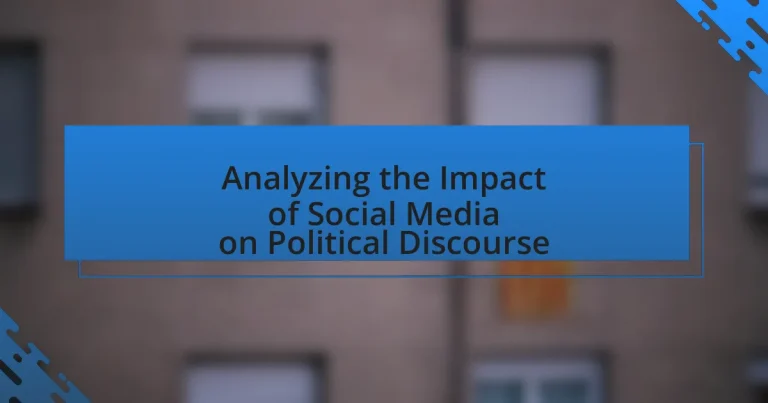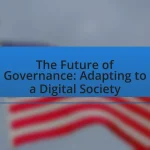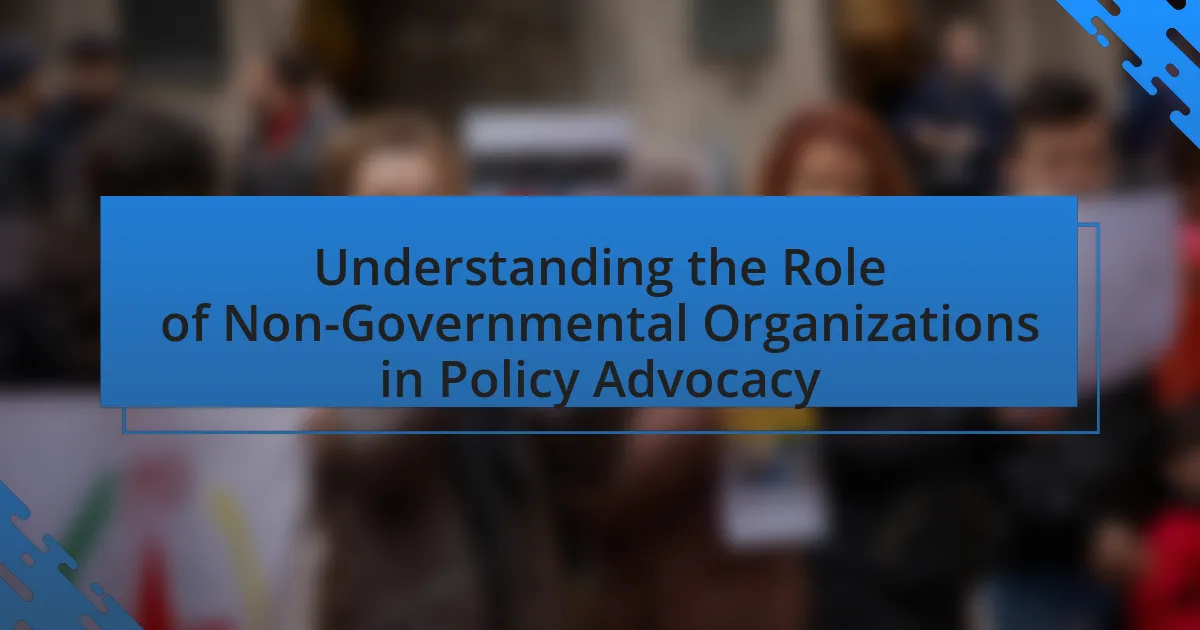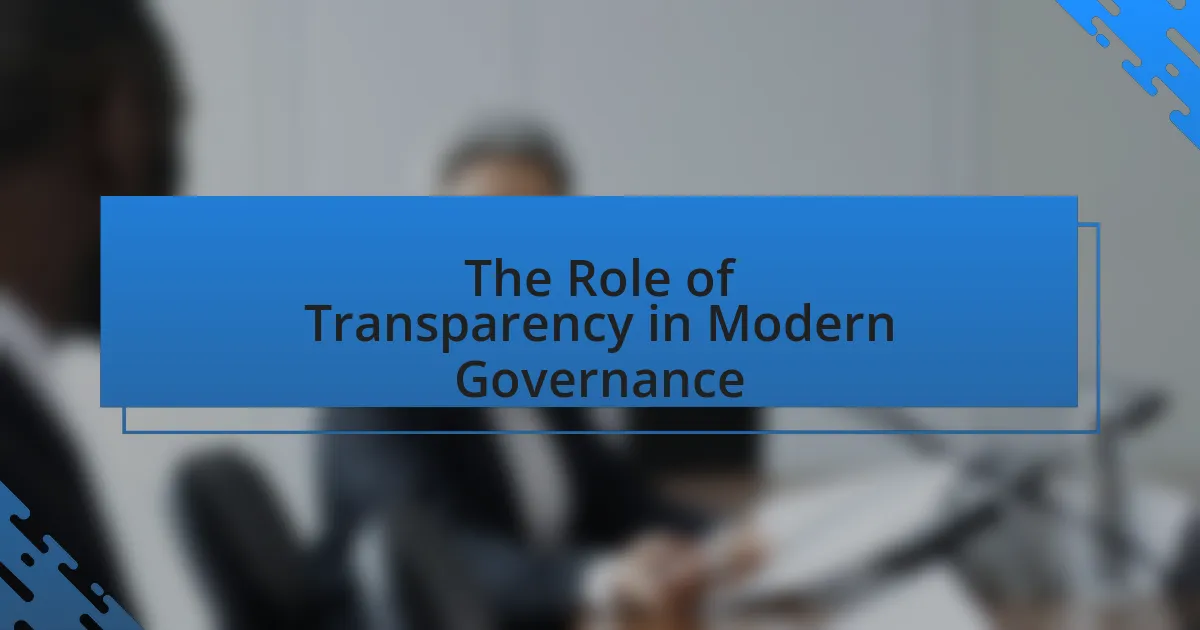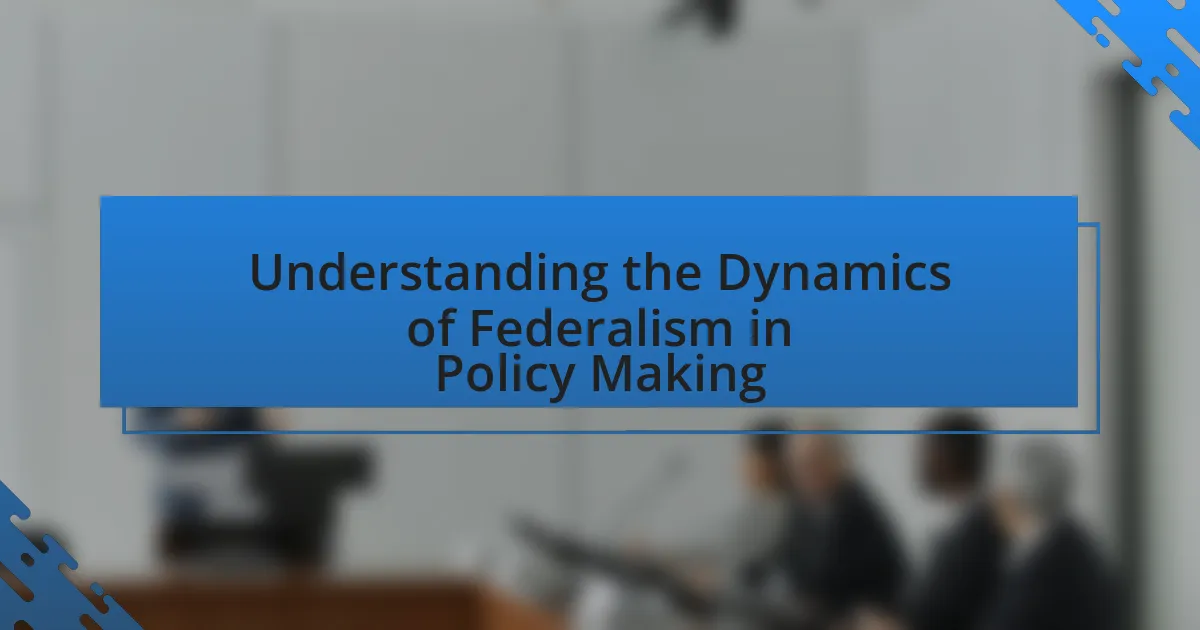The article analyzes the impact of social media on political discourse, highlighting its role in facilitating rapid information dissemination and amplifying diverse viewpoints. It discusses how social media transforms traditional political communication by enabling direct interaction between politicians and the public, fostering grassroots movements, and enhancing political engagement. Key features of social media, such as user-generated content and algorithm-driven curation, are examined for their influence on political discussions, including the creation of echo chambers and the spread of misinformation. The article also addresses the positive and negative effects of social media on political polarization, public opinion, and voter behavior, emphasizing the importance of understanding these dynamics for a healthier democratic process.
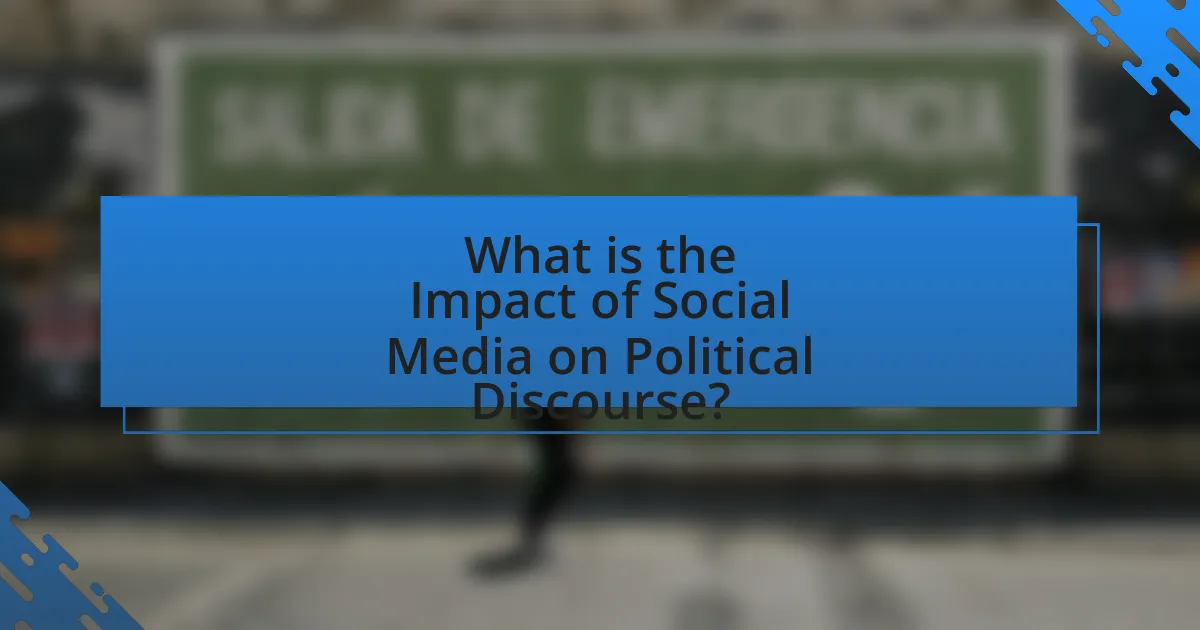
What is the Impact of Social Media on Political Discourse?
The impact of social media on political discourse is significant, as it facilitates rapid information dissemination and amplifies diverse viewpoints. Social media platforms enable users to engage in discussions, share opinions, and mobilize support for political causes, leading to increased political participation. According to a Pew Research Center study, 69% of adults in the U.S. use social media, which has transformed how political information is consumed and shared. This shift has also contributed to the rise of echo chambers, where individuals are exposed primarily to viewpoints that reinforce their beliefs, potentially polarizing political opinions. Furthermore, social media has been instrumental in organizing movements, such as the Arab Spring, demonstrating its power in shaping political landscapes.
How has social media transformed traditional political communication?
Social media has transformed traditional political communication by enabling direct interaction between politicians and the public, bypassing traditional media gatekeepers. This shift allows for real-time engagement, where politicians can share messages instantly and receive immediate feedback from constituents. For instance, during the 2008 U.S. presidential election, Barack Obama effectively utilized platforms like Facebook and Twitter to mobilize supporters and disseminate information, resulting in a significant increase in voter engagement and turnout. Additionally, social media has democratized political discourse, allowing diverse voices and grassroots movements to gain visibility, as seen with the #MeToo and Black Lives Matter movements, which have influenced political agendas and public policy discussions.
What are the key features of social media that influence political discourse?
The key features of social media that influence political discourse include user-generated content, real-time communication, algorithm-driven content curation, and the ability to mobilize communities. User-generated content allows individuals to share opinions and information, shaping public perception and debate. Real-time communication facilitates immediate responses to political events, enabling rapid dissemination of information and reactions. Algorithm-driven content curation prioritizes certain viewpoints, potentially creating echo chambers that reinforce existing beliefs. Additionally, social media platforms enable the mobilization of communities around political causes, as seen in movements like Black Lives Matter and the Arab Spring, where online organizing translated into offline action. These features collectively alter how political discourse is conducted and perceived in contemporary society.
How do different social media platforms vary in their impact on political discussions?
Different social media platforms significantly vary in their impact on political discussions due to their unique user demographics, content formats, and engagement mechanisms. For instance, Twitter facilitates rapid information dissemination and real-time discussions, making it a preferred platform for political debates and breaking news, as evidenced by its role in the Arab Spring where tweets mobilized protests. In contrast, Facebook’s algorithm promotes community building and longer-form content, allowing for in-depth discussions but also creating echo chambers, as shown by research from the Pew Research Center indicating that users often engage with like-minded individuals, reinforcing existing beliefs. Instagram, with its visual focus, influences political discussions through imagery and storytelling, appealing particularly to younger audiences, which can shape perceptions and mobilize activism, as seen in various climate change campaigns. Each platform’s design and user interaction patterns thus shape the nature and quality of political discourse.
Why is understanding this impact important for society?
Understanding the impact of social media on political discourse is crucial for society because it shapes public opinion and influences democratic processes. Social media platforms serve as primary channels for information dissemination, affecting how citizens engage with political content and participate in discussions. Research indicates that 69% of adults in the U.S. use social media, making it a significant factor in shaping political views and behaviors. Furthermore, the spread of misinformation on these platforms can lead to polarization and undermine trust in democratic institutions, as evidenced by studies showing that false information spreads faster than factual content. Therefore, comprehending this impact enables society to foster informed citizenry and promote healthier political dialogue.
What role does political discourse play in a democratic society?
Political discourse serves as a fundamental mechanism for facilitating communication and debate among citizens in a democratic society. It enables the exchange of ideas, opinions, and information, which is essential for informed decision-making and civic engagement. Political discourse fosters public deliberation, allowing diverse viewpoints to be expressed and considered, thereby enhancing the democratic process. Research indicates that robust political discourse can lead to increased political participation and voter turnout, as seen in studies conducted by the Pew Research Center, which found that individuals engaged in political discussions are more likely to vote and participate in civic activities.
How can social media shape public opinion and voter behavior?
Social media can significantly shape public opinion and voter behavior by facilitating the rapid dissemination of information and enabling targeted communication. Platforms like Facebook and Twitter allow users to share news, opinions, and political content, which can influence perceptions and attitudes toward candidates and issues. Research indicates that social media can create echo chambers, where users are exposed primarily to viewpoints that reinforce their existing beliefs, thereby solidifying partisan divides. For instance, a study by the Pew Research Center found that 62% of Americans get news from social media, highlighting its role in shaping political awareness and engagement. Additionally, social media campaigns can mobilize voters by encouraging participation through events, discussions, and calls to action, as seen in the 2016 U.S. presidential election, where social media played a crucial role in voter turnout among younger demographics.
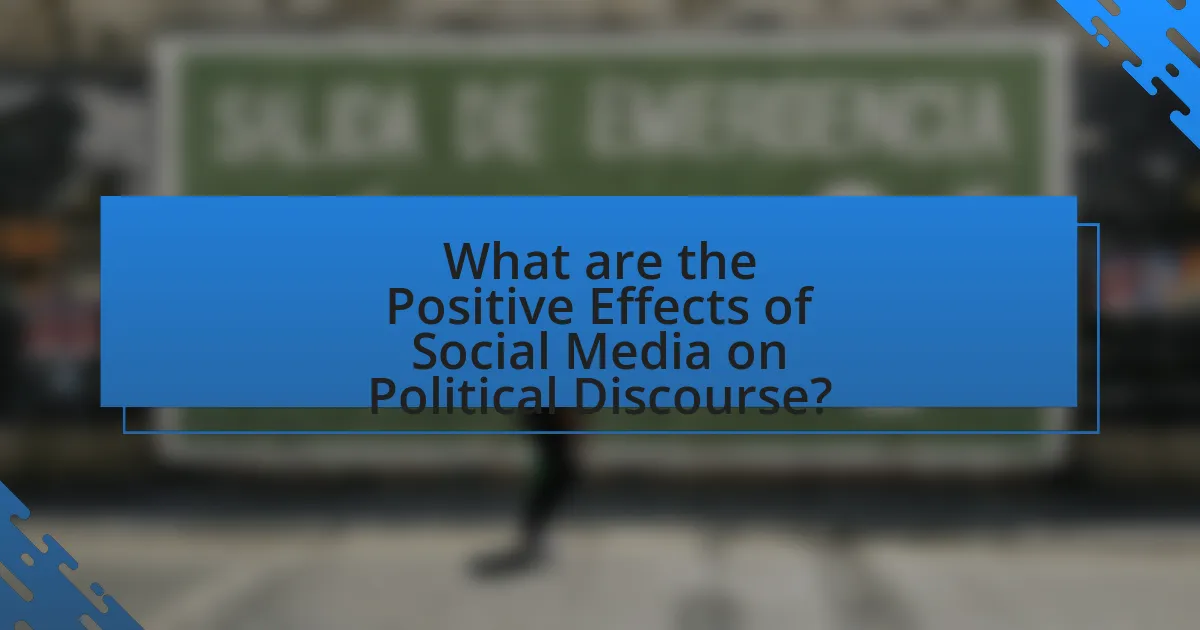
What are the Positive Effects of Social Media on Political Discourse?
Social media positively influences political discourse by enhancing public engagement and facilitating the dissemination of information. Platforms like Twitter and Facebook allow users to share opinions, mobilize support for causes, and participate in discussions, which increases political awareness and activism. For instance, a study by the Pew Research Center found that 70% of social media users engage with political content, leading to greater voter turnout and participation in civic activities. Additionally, social media provides a space for marginalized voices to be heard, promoting diversity in political discussions and challenging traditional media narratives. This democratization of information enables a broader range of perspectives, fostering a more informed electorate.
How does social media enhance political engagement among citizens?
Social media enhances political engagement among citizens by providing a platform for real-time communication and information sharing. This immediacy allows users to access news, participate in discussions, and mobilize for causes quickly. For instance, a study by the Pew Research Center found that 69% of adults in the U.S. use social media, with many reporting that these platforms help them stay informed about political issues and connect with like-minded individuals. Additionally, social media facilitates grassroots movements, as seen in events like the Arab Spring, where platforms like Twitter and Facebook were instrumental in organizing protests and spreading awareness.
What are the ways social media facilitates grassroots movements?
Social media facilitates grassroots movements by providing a platform for rapid communication, mobilization, and community building. It enables activists to share information quickly, organize events, and rally support from a broad audience. For instance, the Arab Spring demonstrated how platforms like Twitter and Facebook were instrumental in coordinating protests and disseminating real-time updates, leading to significant political changes in several countries. Additionally, social media allows for the amplification of marginalized voices, fostering inclusivity and engagement in political discourse. Studies have shown that movements such as Black Lives Matter gained momentum through social media campaigns, highlighting issues of racial injustice and mobilizing supporters globally.
How does social media provide a platform for marginalized voices in politics?
Social media provides a platform for marginalized voices in politics by enabling direct communication and engagement without traditional gatekeeping. This democratization of information allows individuals from underrepresented communities to share their perspectives, mobilize support, and influence political discourse. For instance, movements like Black Lives Matter have utilized platforms such as Twitter and Instagram to amplify their messages, garner widespread attention, and organize protests, demonstrating the effectiveness of social media in elevating marginalized voices. Additionally, studies indicate that social media can increase political participation among marginalized groups, as it offers a space for dialogue and community building that traditional media often overlooks.
What are the educational benefits of social media in political discussions?
Social media enhances educational benefits in political discussions by facilitating access to diverse viewpoints and fostering critical thinking. Users can engage with a wide range of perspectives, which encourages them to analyze and evaluate different arguments. Research indicates that exposure to varied opinions can improve understanding of complex political issues, as seen in studies like the Pew Research Center’s findings, which show that individuals who engage with diverse political content online are more likely to develop informed opinions. Additionally, social media platforms often provide educational resources, such as articles, videos, and expert commentary, which further enrich users’ knowledge and understanding of political topics.
How does social media contribute to the dissemination of political information?
Social media significantly contributes to the dissemination of political information by providing a platform for rapid sharing and engagement among users. This immediacy allows political messages, news, and opinions to spread quickly across vast networks, reaching diverse audiences. For instance, during the 2016 U.S. presidential election, platforms like Twitter and Facebook were instrumental in shaping public discourse, with over 60% of Americans reporting that they received news about the election through social media. Additionally, social media enables targeted communication, allowing political campaigns to tailor messages to specific demographics, enhancing the effectiveness of their outreach. The ability to share content instantly and engage in discussions amplifies the reach and impact of political information, making social media a crucial tool in modern political communication.
What role do influencers play in educating the public about political issues?
Influencers play a significant role in educating the public about political issues by leveraging their platforms to disseminate information and engage audiences. They often simplify complex political topics, making them more accessible to a broader demographic. For instance, a study by the Pew Research Center found that 55% of social media users have engaged with political content, indicating that influencers can effectively reach and inform large audiences. Additionally, influencers often collaborate with organizations to promote civic engagement, such as voter registration drives, thereby enhancing public awareness and participation in political processes.
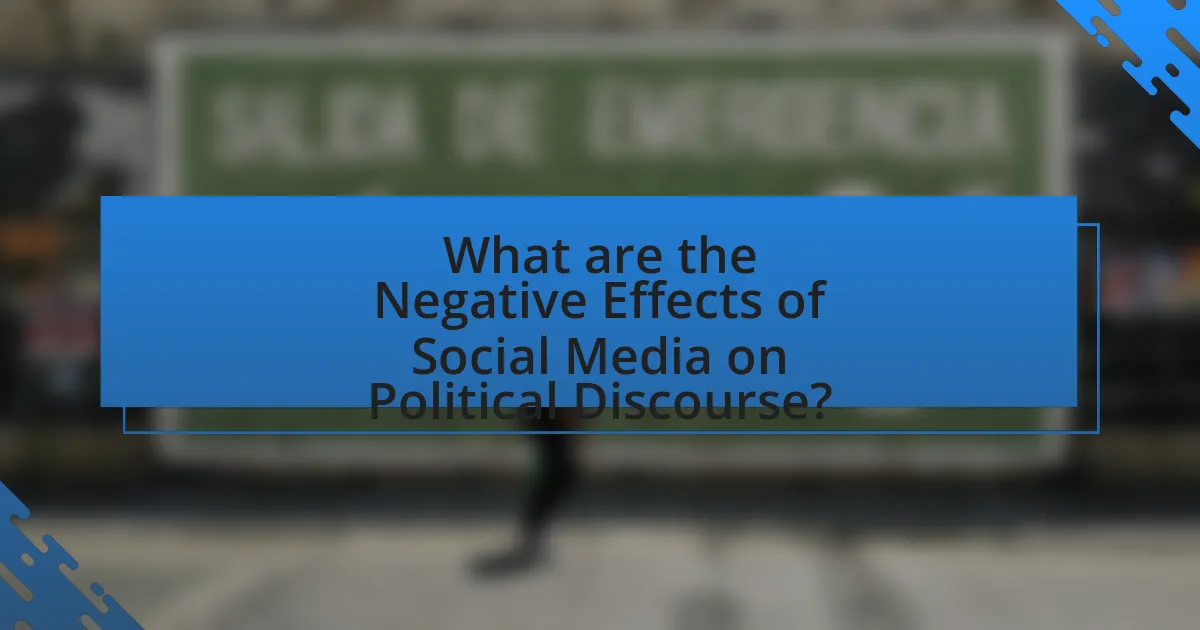
What are the Negative Effects of Social Media on Political Discourse?
Social media negatively affects political discourse by fostering polarization, spreading misinformation, and reducing the quality of public debate. Research indicates that social media platforms often create echo chambers, where users are exposed primarily to viewpoints that reinforce their own beliefs, leading to increased political division. A study published in the journal “Nature” found that misinformation spreads six times faster on social media than factual information, undermining informed decision-making among the public. Additionally, the brevity of social media interactions can lead to oversimplification of complex political issues, diminishing the depth and quality of discussions.
How does misinformation spread through social media platforms?
Misinformation spreads through social media platforms primarily via algorithms that prioritize engagement over accuracy. These algorithms amplify sensational content, leading to rapid dissemination of false information as users share and react to misleading posts. A study by the Massachusetts Institute of Technology found that false news stories are 70% more likely to be retweeted than true stories, highlighting the viral nature of misinformation. Additionally, the ease of sharing and the lack of fact-checking mechanisms on many platforms contribute to the proliferation of misleading narratives, particularly during critical events like elections.
What are the consequences of fake news on political opinions?
Fake news significantly alters political opinions by spreading misinformation that can lead to polarized views among the electorate. Research indicates that exposure to false information can reinforce existing biases, causing individuals to become more entrenched in their political beliefs. A study published in the journal “Science” by Vosoughi, Roy, and Aral in 2018 found that false news stories are 70% more likely to be retweeted than true stories, demonstrating the rapid spread of misinformation. This phenomenon can distort public perception of political issues and candidates, ultimately influencing voting behavior and undermining democratic processes.
How do algorithms contribute to echo chambers in political discourse?
Algorithms contribute to echo chambers in political discourse by prioritizing content that aligns with users’ existing beliefs, thereby limiting exposure to diverse viewpoints. Social media platforms utilize algorithms that analyze user behavior, such as likes, shares, and comments, to curate personalized feeds that reinforce users’ preferences. This selective exposure creates an environment where individuals predominantly encounter information that confirms their biases, leading to polarized opinions. Research by the Pew Research Center indicates that 62% of social media users encounter mostly like-minded content, which exacerbates the formation of echo chambers and diminishes constructive political dialogue.
What impact does social media have on political polarization?
Social media significantly contributes to political polarization by facilitating echo chambers and reinforcing partisan identities. Research indicates that users are more likely to engage with content that aligns with their pre-existing beliefs, leading to a decrease in exposure to diverse viewpoints. A study by the Pew Research Center found that 62% of social media users encounter mostly like-minded opinions, which exacerbates divisions. Additionally, algorithms prioritize content that generates engagement, often amplifying extreme views and further entrenching users in their ideological positions. This dynamic creates a feedback loop that intensifies political polarization in society.
How does social media contribute to the division of political ideologies?
Social media contributes to the division of political ideologies by facilitating echo chambers and selective exposure to information. Users often engage with content that aligns with their pre-existing beliefs, leading to a reinforcement of those views and a decreased likelihood of encountering opposing perspectives. Research by the Pew Research Center indicates that 62% of social media users have unfollowed or blocked someone due to political posts, highlighting the tendency to curate one’s online environment to avoid dissenting opinions. This behavior fosters polarization, as individuals become more entrenched in their ideologies and less open to dialogue, ultimately deepening societal divides.
What are the psychological effects of consuming politically charged content on social media?
Consuming politically charged content on social media can lead to increased anxiety, polarization, and a sense of social isolation. Research indicates that exposure to such content often heightens emotional responses, leading to stress and anxiety, particularly during election cycles or political crises. A study published in the journal “Computers in Human Behavior” found that individuals who frequently engage with politically charged posts report higher levels of anxiety and depressive symptoms. Additionally, the reinforcement of existing beliefs through echo chambers can result in greater political polarization, making individuals more extreme in their views. This polarization can contribute to feelings of isolation, as users may feel disconnected from those with differing opinions, further exacerbating mental health issues.
How can individuals and organizations mitigate the negative effects of social media on political discourse?
Individuals and organizations can mitigate the negative effects of social media on political discourse by promoting media literacy and encouraging critical thinking among users. Media literacy initiatives help individuals discern credible information from misinformation, which is crucial given that studies show that false information spreads faster on social media than true information. For instance, a 2018 study published in Science found that false news stories were 70% more likely to be retweeted than true stories. Organizations can also implement policies that promote respectful dialogue and discourage hate speech, as research indicates that hostile interactions can polarize opinions and reduce constructive discourse. Furthermore, fostering diverse viewpoints in online discussions can counteract echo chambers, which are known to reinforce biases and limit exposure to differing perspectives.
What strategies can be employed to promote critical thinking in political discussions online?
To promote critical thinking in political discussions online, strategies such as encouraging diverse viewpoints, fostering respectful dialogue, and utilizing fact-checking resources can be employed. Encouraging diverse viewpoints allows participants to consider multiple perspectives, which enhances analytical skills and reduces echo chambers. Fostering respectful dialogue creates an environment where individuals feel safe to express their thoughts, leading to more thoughtful exchanges. Utilizing fact-checking resources helps participants verify claims and encourages evidence-based discussions, which is essential for critical analysis. Research indicates that exposure to varied opinions and structured debate formats significantly improves critical thinking skills in online environments.
How can fact-checking initiatives improve the quality of political discourse on social media?
Fact-checking initiatives can improve the quality of political discourse on social media by providing accurate information that counters misinformation. These initiatives help to clarify facts, reduce the spread of false narratives, and promote informed discussions among users. For instance, a study by the Pew Research Center found that users exposed to fact-checking are more likely to recognize false claims and adjust their beliefs accordingly. By enhancing the accuracy of information shared, fact-checking initiatives foster a more constructive and respectful dialogue, ultimately leading to a healthier political environment online.
